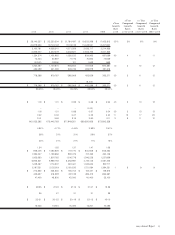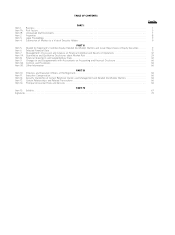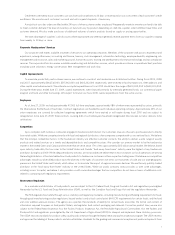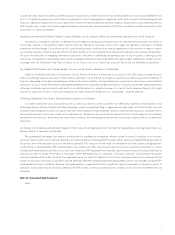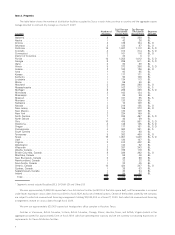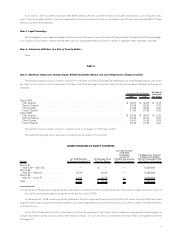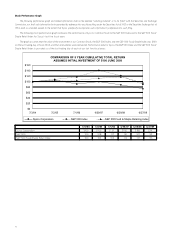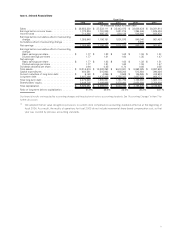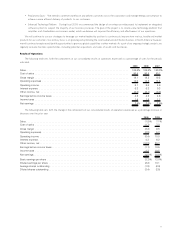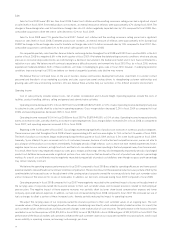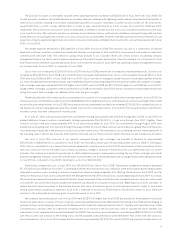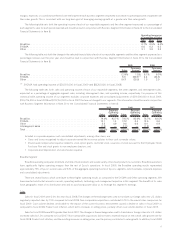Sysco 2009 Annual Report Download - page 27
Download and view the complete annual report
Please find page 27 of the 2009 Sysco annual report below. You can navigate through the pages in the report by either clicking on the pages listed below, or by using the keyword search tool below to find specific information within the annual report.acquired business may be more difficult when we acquire a business in a market in which we have limited expertise, or with a culture different from
Sysco’s. A significant expansion of our business and operations, in terms of geography or magnitude, could strain our administrative and operational
resources. Significant acquisitions may also require the issuance of material additional amounts of debt or equity, which could materially alter our
debt to equity ratio, increase our interest expense and decrease earnings per share, and make it difficult for us to obtain favorable financing for other
acquisitions or capital investments.
Expanding into International Markets Presents Unique Challenges, and our Expansion Efforts and International Operations may not be Successful
In addition to our domestic activities, an element of our strategy includes expansion of operations into new international markets. Our ability to
successfully operate in international markets may be adversely affected by local laws and customs, legal and regulatory constraints, including
compliance with the Foreign Corrupt Practices Act, political and economic conditions and currency regulations of the countries or regions in which
we currently operate or intend to operate in the future. Risks inherent in our existing and future international operations also include, among others,
the costs and difficulties of managing international operations, difficulties in identifying and gaining access to local suppliers, suffering possible
adverse tax consequences, maintaining product quality and greater difficulty in enforcing intellectual property rights. Additionally, foreign currency
exchange rates and fluctuations may have an impact on our future costs or on future sales and cash flows from our international operations.
Our Preferred Stock Provides Anti-Takeover Benefits that may not be Viewed as Beneficial to Stockholders
Under our Restated Certificate of Incorporation, Sysco’s Board of Directors is authorized to issue up to 1,500,000 shares of preferred stock
without stockholder approval. Issuance of these shares could make it more difficult for anyone to acquire Sysco without approval of the Board of
Directors, depending on the rights and preferences of the stock issued. In addition, if anyone attempts to acquire Sysco without approval of the Board
of Directors of Sysco, the existence of this undesignated preferred stock could allow the Board of Directors to adopt a shareholder rights plan without
obtaining stockholder approval, which could result in substantial dilution to a potential acquirer. As a result, hostile takeover attempts that might
result in an acquisition of Sysco, that could otherwise have been financially beneficial to our stockholders, could be deterred.
Technology Dependence Could have a Material Negative Impact on our Business
Our ability to decrease costs and increase profits, as well as our ability to serve customers most effectively, depends on the reliability of our
technology network. We use software and other technology systems, among other things, to generate and select orders, to load and route trucks and
to monitor and manage our business on a day-to-day basis. Any disruption to these computer systems could adversely impact our customer service,
decrease the volume of our business and result in increased costs. While Sysco has invested and continues to invest in technology security initiatives
and disaster recovery plans, these measures cannot fully insulate us from technology disruption that could result in adverse effects on operations
and profits.
Our Design of an Enterprise-wide Software Integration Project may not be Implemented and in the Event of Implementation may Negatively Impact our
Business, Results of Operations and Liquidity
We commenced the design of an enterprise-wide project to implement an integrated software system to support a majority of our business
processes. These systems are commonly referred to as Enterprise Resource Planning (ERP) systems. When we have completed the design phase of
this project, which we anticipate to occur by the end of calendar 2009, a decision will be made as to whether to build the system as designed and if
so, the timing of implementation. ERP implementations are complex and time- consuming projects that involve substantial investments in system
software and implementation activities over a multi-year timeframe. ERP implementations typically require transformation of business and financial
processes in order to realize the benefits of the project. When the design phase is complete, if we reach a decision to discontinue the project,
amounts invested will be written off which may negatively impact our results of operations at that time. If we reach a decision to continue with the
project, our business and results of operations may be adversely affected if we experience operating problems and/or cost overages during the ERP
implementation process. In addition, because the implementation is expected to involve a significant capital commitment, our business, results of
operations and liquidity may be adversely affected if the ERP system, and the associated process changes, do not result in the benefits that we
anticipate.
Item 1B. Unresolved Staff Comments
None.
7


